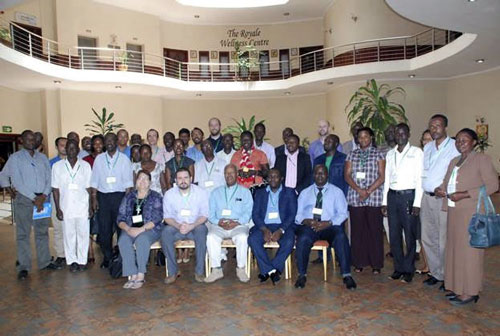Born out of the Drought Tolerant Maize for Africa (DTMA) Initiative and other CIMMYT-Africa maize projects, the Drought Tolerant Maize for Africa Seed Scaling (DTMASS) project will improve the demand for and availability of high-quality, affordable, certified seed of drought-tolerant maize varieties for small-scale farmers across eastern and southern Africa.
“DTMASS aims to produce close to 12,000 tons of certified seed of drought-tolerant maize varieties by the end of its fifth year,” said Tsedeke Abate, DTMA project leader who will also lead DTMASS, speaking at the Uganda launch of the project in Kampala on 4 February. “This will benefit approximately 2.5 million people through the increased production and productivity of maize and the adoption of improved certified seed.”
According to Abate, DTMASS will strengthen the formal seed system, thereby reducing counterfeit seed use, lowering the risk of seed-borne maize diseases and helping to maintain productivity as climates change.
Working in Ethiopia, Kenya, Malawi, Mozambique, Tanzania, Uganda and Zambia, DTMASS will encourage cross-country learning and collaboration, Abate explained: “We have the knowledge and technology – what remains is translating knowledge to action.”
DTMASS countries account for 41 percent of maize area and production, and over 252 million people in sub-Saharan Africa.
A pillar of the project will be its strong partnerships with private and public seed companies, community-based organizations, non-governmental organizations and national extension systems. Fifty-three seed companies have already agreed to produce seed of 71 drought-tolerant varieties.
These partnerships enable increased and improved certified seed to reach small-scale farmers, increase farm production and enhance productivity, according to Dr. Imelda Kashaija, deputy director at Uganda’s National Agricultural Research Organization (NARO). “This project is at the right place at the right time,” she said.
DTMASS launched officially on 17-18 November 2014 in Addis Ababa, Ethiopia. The goal for Uganda in 2015 is to produce 1,800 tons of improved maize seed.

 Climate adaptation and mitigation
Climate adaptation and mitigation